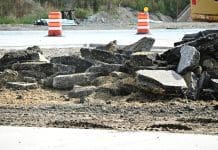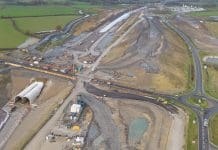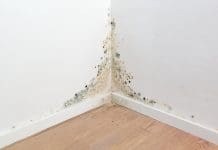Infrastructure contractor, Colas, has launched an exoskeleton designed to give power assistance to road workers working on levelling with a rake
The ‘Exopush’ has been launched in the UK to assist road workers.
Amongst emerging benefits will be productivity gains and increased efficiency, as well as direct cost savings from lost time at work in the industry, due to multiskeletal problems.
Co-created with RB3D, an Auxerre-based company specialising in the construction of cobots and exoskeletons, this new exoskeleton is a direct outcome of the Colas Group Open Innovation programme where innovative solutions are co-created by bringing together start-ups and Colas’s operational team.
The Colas UK team took delivery of the first 2 Exopush units in Autumn 2019 for training and trials. The first deployment of the Exopush on live sites started in January 2020 with plans in hand for rollout deployment across the UK business.
Benefits to road workers
Protected by three international patents, the Exopush improves the ergonomics of the raking task and is designed to reduce fatigue and physical stress experienced by operatives and to enhance wellbeing.
The user handles an electric actuator which helps push or pull the tool, while the weight is taken up by a harness and link to the ground via a force leg attached to the shoe with a footplate.
The kit weighs 8.2 kilogrammes, with a 5 to 7 hours runtime from each of 2 electric batteries per unit. The carrying kit fits easily in the crew bus and takes under 2 minutes to get ready. It can push/pull up to 50 kg and reduces repetition movement up to 5-fold for the user. It protects the back and shoulders with a balance of tension on the shoulders and by reducing the fluctuating distribution of loads during movement.
Benefits from improved posture are significant. An average posture for raking is at 53 degrees of bending the back, which Exopush straightens to a more upright 21 degrees while reducing twisting of the trunk and neck extension yet keeping full freedom of movement.
In-house studies on heart rate show a 124-144 pulse rate per minute generally in raking activity. With Exopush this stays in the range of 124 – 128 pulse rate per minute.
Repetitive stress is also reduced with 30% fewer movements on average, and work-related strain is reduced by between 5 and 10-fold with less perspiration and back pain.
It is compliant with the AFNOR NF X35-109 standard and relevant on jobs where materials are spread by hand (asphalt or white materials), where application takes place without hindrance, and for where over 5 to 10 tonnes of materials are laid.
In reducing the risk of musculoskeletal disease and enhancing the quality of life in and out of the workplace, it is expected that Exopush may help with the industry recruitment challenge for road workers by overcoming the low attractiveness for strenuous jobs.














